#David Starkey
Text
The concentration of chapel goods among the items delivered to Elizabeth provides another indication that the Privy Council did not exercise exclusive control over the selections made for the princesses. Had this been the case, the Council would seem to have acted arbitrarily indeed in awarding Elizabeth a broad range of chapel furnishings, yet allowing only one altar cloth to Mary. Even Starkey, who assigns agency to the Privy Council in the selection of these goods, admits that it is "curious" that Elizabeth received more chapel goods than Mary. Elizabeth had already demonstrated a keen interest in religion. She had presented translations of religious treatises from French, Latin, and Italian sources as gifts to Henry VIII and Katherine Parr. Surely, the most reasonable explanation is that Elizabeth [...] asked for these chapel goods herself.
Jeri L. McIntosh. From Heads of Household to Heads of State: The Preaccession Households of Mary and Elizabeth Tudor, 1516–1558.
#'corrective to the common cliche about the lushly pious mary versus the coolly secular elizabeth' diarmaid; the man that you are...#jeri l mcintosh#elizabeth i#david starkey#henry viii
9 notes
·
View notes
Text
coastalcurmudgeon asked: Hi, would you mind pointing me towards any articles, books, video essays etc that make reasonable modern pro-monarchist arguments? When queen Elizabeth passed a few months ago it got me wondering why not just the British but several other wealthy democratic nations hang on to their monarchs. I'm from the US so it's a little difficult to understand the monarchies perspective off the bat and you seemed a good person to ask about where to find good arguments for it. Thanks and have a nice day
I want to thank you for asking such a simple question but one that many of us don’t really give a thought to. We get sucked into the tittle tattle of court intrigue or the tawdry gossip of the latest royal scandal made public, partly because it’s a visceral pleasure to see those above us squirm in discomfort, and partly to see them bleed - perhaps to remind us that they are as mortal and as fallen as we all are.
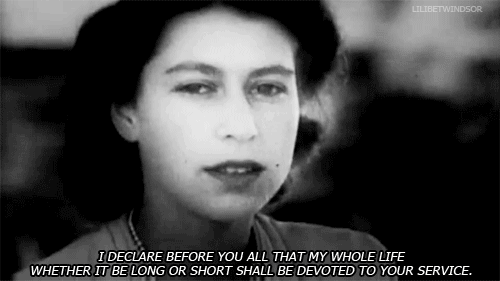
In the wake of Queen Elizabeth II’s death, the question of monarchy is brought sharply into focus. The sombre and reflective tone of the tributes to the late Queen Elizabeth II suggests the esteem in which she was held, as well as the apparent popularity of Britain’s constitutional monarchy. But it was not always so, as the queen herself was fully aware. She might have remained more or less beyond reproach, but her family-members have not. Often the Windsors seemed like a bad soap opera, attracting derision and resentment in equal measure. Yet, like their ancestors, they have slogged on regardless. Other monarchies have been toppled, or cut down to size, all over Europe and beyond.
We focus on the institution and its rituals and trappings without asking the underlying question of why? Why do we believe in the institution? It’s a question that even ardent monarchists find hard to answer properly.
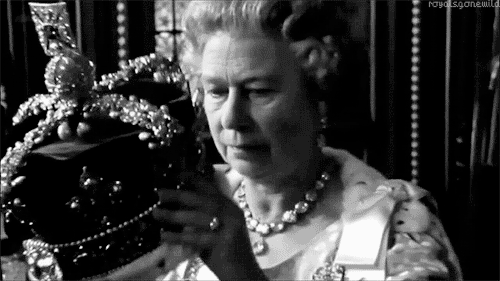
The hard leftists of course do know why they want to get rid of a monarchy in the name of some vague and unrealised ideal of equality and freedom from tyranny as well in the name of democracy. They do so out of historical ignorance given that the constitutional monarchy does exactly that and has been paradoxically a guarantor of these ideals through custom, heritage, and the rule of common law. For them it’s better to destroy than it is to build as Roger Scruton once said. Being historically illiterate, they don’t fully understand the folly on pulling one thread runs the danger pulling the entire tapestry of a nation apart.
I don’t want to caricature all them with one brush because not all leftists believe in the destruction of the monarchy in Britain. Some understand its value and even harmonise it within their leftist beliefs.
Stephen Fry, a socialist in his political beliefs but still widely considered (and righty so) as a national treasure, came out in his support of the monarchy in Britain. The beloved British actor, writer and presenter admitted in a podcast with Jordan Peterson that the Royal Family in interviews that “on the face of it is of course preposterous”. But he went on to explain how they can play a key role in society. The author referred to the Queen’s weekly Audience with the Prime Minister and suggested that the US could benefit from having a Monarch. He explained how his thoughts stemmed from his belief in “ceremony, ritual and symbolism”.

Fry told the podcast: “I look at America and I think if only Donald Trump and now Biden, if every week they had to walk up the hill and go into a mansion in Washington and there was uncle Sam in a top hat and striped trousers.” He explained how “uncle Sam” might be the US equivalent of a Monarch and described him as “a living embodiment of their nation”.
Stephen Fry added: “More important than they were that’s the key. He [uncle Sam] is America, the President is a fly-by-night politician voted for by less than half the population and he has to bow in front of this personification of his country every week. And that personification, uncle Sam can’t tell him what to do, uncle Sam can’t say ‘pass this Act and don’t pass that Act and free these people, give them a pardon’. All he can do is say ‘tell me young fella what you done this week’ and he’ll bow and say ‘well uncle Sam’.”
He suggested how uncle Sam might reply “oh you think that’s the right thing for my country”. Fry concluded: “Well that’s what a constitutional monarchy is and of course it’s absurd but the fact that Churchill and Thatcher and everyone had to bow every week in front of this something.”
The author went on to claim that “empirically look at the happiest countries in the world that’s all you need do and they happen to be constitutional monarchies”. Fry finished up by listing Norway, Sweden, Belgium, the Netherlands, Luxembourg and Japan as some of those "happiest" places who have monarchies.: “They’re always right up there on the list. Now it may be that we can’t find the causal link between the constitutional monarchy but it might just be something to do with that.”
I happen to think Stephen Fry is right. For these reasons yes, but there are much better ones too.
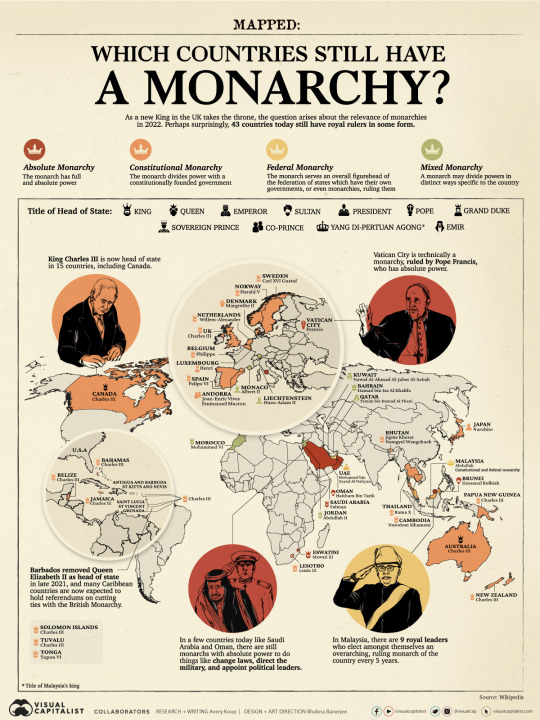
It’s first worth stating it helps to understand what kind of monarchy are we talking about? A surprising number of countries have ruling monarchs but not the same role or power. It’s important to break down the distinctions between the types of monarchies that exist today. Generally, there are four kinds.
In the constitutional monarchy, the monarch divides power with a constitutionally founded government. In this situation, the monarch, while having ceremonial duties and certain responsibilities, does not have any political power. For example, the UK’s monarch must sign all laws to make them official, but has no power to change or reject new laws. Example of countries that follow this are United Kingdom, Japan, and Denmark.
In the absolutist monarchy the monarch has full and absolute political power. They can amend, reject, or create laws, represent the country’s interests abroad, appoint political leaders, and so on. Such countries Said Arabia and Eswatini and even arguably the Vatican (the Papal office is like an absolutist monarch but of the church).
In the federal monarchy the monarch serves an overall figurehead of the federation of states which have their own governments, or even monarchies, ruling them. These countries include UAE and Malaysia.
In the mixed monarchy there is an unusual situation wherein an absolute monarch may divide powers in distinct ways specific to the country. Here Jordan, Liechtenstein, and Morocco are stand out examples.
To many contemporary critics and political progressives, monarchies seem to be purposeless antiquated relics, anachronisms that ought to eventually give way to republics.
On the contrary, nothing can be farther from the truth. Monarchies have an extremely valuable role to play, even in the 21st century and beyond. If anything their number should be added to rather than subtracted from. To understand why, it is important to consider the merits of monarchy objectively without resorting to the tautology that countries ought to be democracies because they ought to be democracies.

There are several advantages in having a monarchy in the 21st century. First, monarchs can rise above politics in the way an elected head of state cannot. Monarchs represent the whole country in a way democratically elected leaders cannot and do not. The choice for the highest political position in a monarchy cannot be influenced by and in a sense beholden to money, the media, or a political party.
Secondly and closely related to the previous point is that in factitious countries like Thailand, the existence of a monarch is often the only thing holding the country back from the edge of civil war. Monarchs are especially important in multiethnic countries such as Belgium because the institution of monarchy unites diverse and often hostile ethnic groups under shared loyalty to the monarch instead of to an ethnic or tribal group. The Habsburg dynasty held together a large, prosperous country that quickly balkanised into almost a dozen states of no power without it. If the restoration of the erstwhile king of Afghanistan, Zahir Shah, widely respected by all Afghans, went through after the overthrow of the Taliban in 2001, perhaps Afghanistan would have more quickly risen above the factionalism and rivalry between various warlords.
Third, monarchies prevent the emergence of extreme forms of government in their countries by fixing the form of government. All political leaders must serve as prime ministers or ministers of the ruler. Even if actual power lies with these individuals, the existence of a monarch makes it difficult to radically or totally alter a country’s politics. The presence of kings in Cambodia, Jordan, and Morocco holds back the worst and more extreme tendencies of political leaders or factions in their countries. Monarchy also stabilises countries by encouraging slow, incremental change instead of extreme swings in the nature of regimes. The monarchies of the Arab states have established much more stable societies than non-monarchic Arab states, many of which have gone through such seismic shifts over the course of the Arab Spring.
Fourth, monarchies have the gravitas and prestige to make last-resort, hard, and necessary decisions - decisions that nobody else can make. For example, Juan Carlos of Spain - now in disgrace but not in the beginning of his reign - personally ensured his country’s transition to a constitutional monarchy with parliamentary institutions and stood down an attempted military coup. At the end of the Second World War, the Japanese Emperor Hirohito defied his military’s wish to fight on and saved countless of his people’s lives by advocating for Japan’s surrender.
Fifth, monarchies are repositories of tradition and continuity in ever changing times. They remind a country of what it represents and where it came from, facts that can often be forgotten in the swiftly changing currents of politics.
Finally, rather counterintuitively, monarchies can serve up a head of state in a more democratic and diverse way than actual democratic politics. Since anyone, regardless of their personality or interests, can by accident of birth become a monarch, all types of people may become rulers in such a system. The head of state may thus promote causes or stir interest in issues and topics that would otherwise not be significant, as King Charles’ views on architecture and climate change proved. Politicians on the other hand, tend to have a certain personality - they are generally extroverted, can make or raise money, and have a tendency to pander or at least publicly hold to pre-defined mainstream views. The presence of a head of state with a psychological profile different from a politician can be refreshing.
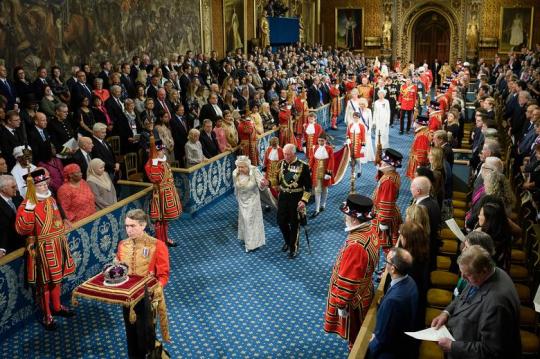
Most of the criticisms of monarchy are no longer valid today, if they were ever valid. These criticisms are usually some variation of two ideas. Firstly, the monarch may wield absolute power arbitrarily without any sort of check, thus ruling as a tyrant. However, in present era, most monarchies rule within some sort of constitutional or traditional framework which constrains and institutionalises their powers. Even prior to this, monarchs faced significant constraints from various groups including religious institutions, aristocracies, the wealthy, and even commoners. Customs, which always shape social interactions, also served to restrain. Even monarchies that were absolute in theory were almost always constrained in practice.
A second criticism is that even a good monarch may have an unworthy successor. However, today’s heirs are educated from birth for their future role and live in the full glare of the media their entire lives. This constrains bad behaviour. More importantly, because they have literally been born to rule, they have constant, hands-on training on how to interact with people, politicians, and the media.
In light of the all the advantages of monarchy, it is clear why many citizens of democracies today have an understandable nostalgia for monarchy. As in previous centuries, monarchy will continue to show itself to be an important and beneficial political institution wherever it still survives.
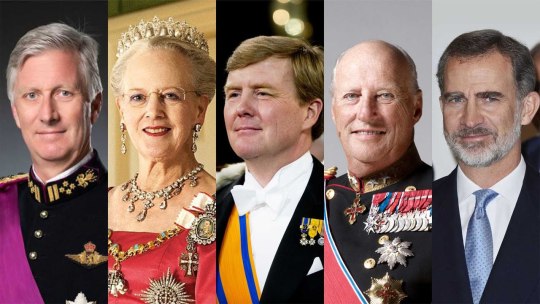
Constitutional monarchies are undoubtedly the most popular form of royal leadership in the modern era, making up close to 70% of all monarchies. This situation allows for democratically elected governments to rule the country, while the monarch performs ceremonial duties. Most monarchs are hereditary, inheriting their position by luck of their birth, but interestingly, the French president, Emmanuel Macron, technically serves as a Co-Prince of Andorra - a fact I enjoy making my good French republican friends squirm in discomfort. But France remains resolutely a republic despite many other European countries being a constitutional monarchy.
Monarchy has a long history in Europe, being the predominant form of government from the Middle Ages until the First World War. At the turn of the twentieth century every country in Europe was a monarchy with just three exceptions: France, Switzerland and San Marino. But by the start of the twenty-first century, most European countries had ceased to be monarchies, and three quarters of the member states of the European Union are now republics. That has led to a teleological assumption that in time most advanced democracies will become republics, as the highest form of democratic government.
But there still remains a stubborn group of countries in Western Europe which defy that assumption, and they include some of the most advanced democracies in the world. In the most recent Democracy Index compiled by the Economist Intelligence Unit, six out of the top ten democracies - and nine of the top 15 - in the world were monarchies. They include six European monarchies: Norway, Sweden, Denmark, the Netherlands, Luxembourg and the UK.
It remains a historical paradox. These monarchies have survived partly for geopolitical reasons, most of the other European monarchies having disappeared at the end of the First or Second World Wars. Their continuance has been accompanied by a steady diminution in their political power, which has shrunk almost to zero, and developing roles that support liberal democracy. What modern monarchies offer is non-partisan state headship set apart from the daily political struggle of executive government; the continuity of a family whose different generations attract the interest of all age groups; and disinterested support for civil society that is beyond the reach of partisan politics. These roles have evolved because monarchy depends ultimately on the support of the public, and is more accountable than people might think.
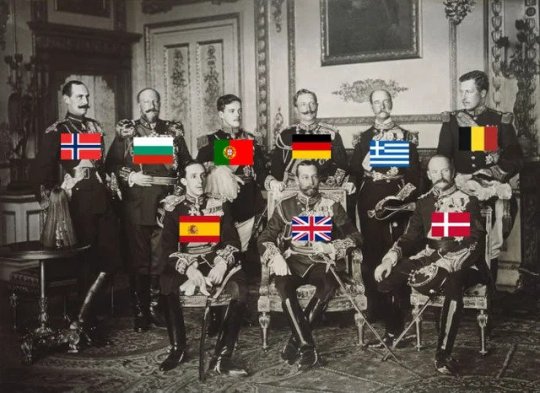
Understanding this paradox of an ancient hereditary institution surviving as a central part of modern democracies is a key part of understanding why monarchies persist and will continue to exist.
I’m going to confine answering your question to constitutional monarchy because it’s what the United Kingdom and the rest of Europe is. This is partly to narrow the wide question to something more manageable but also reflective of the fact that each country is different with its own unique history of customs, traditions, and heritage, and practices of governance, that make up the unique quality of the monarchy in question.
I’m just going to give you a general recommendation list rather than a deep academic dive into political theory. But then theory is no good without practice. History is the best place to start to understand some of the things I’ve already highlighted.
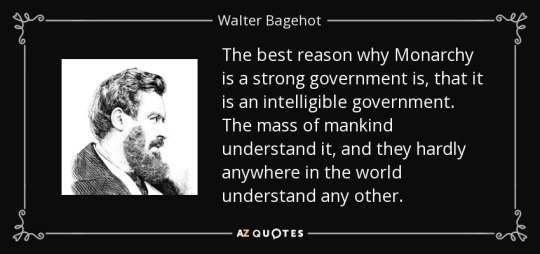
1. The English Constitution by Walter Bagehot
I know I said to start with history and here I’m recommending you begin with reading a book on constitutional theory and practice. But hear me out.
First published in 1867, this remains the indispensable guide to the role and purpose of the British sovereign. The text by Walter Bagehot (who was editor of The Economist for 17 years) is often mistaken for an official account of constitutional monarchy. In fact, it is a lively argument on how Britain’s old institutions should cope with the coming of mass-democracy. It was in this spirit that Bagehot contrasted the “dignified” parts of the constitution - the monarchy and the House of Lords - with the merely “efficient”, the Cabinet, MPs and the like. In the new age of mass-politics, he considered that the role of the monarchy was to “excite and preserve the reverence of the population” for the country’s institutions and government. Although monarchs might not have executive power anymore, they maintained three rights over “efficient” politicians - “to be consulted, to encourage and to warn”.
That the British monarchy survived while many of Europe’s were overthrown is in no small measure to the Windsors’ scrupulousness in following Bagehot’s advice. And, prophetically, he cautioned that the whole royal conjuring trick could only work if its dignity was preserved: “If you begin to poke about it, you cannot reverence it…its mystery is its life. We must not let in daylight upon the magic.”
The great thing is you don’t even have to buy it. Free copies exist online to download. I have my own copy because it really is a sort of bible for me when I have to think soberly and stay grounded as the latest royal scandal erupts and everyone is losing their heads.
2. Crown and Country: A history of England through the Monarchy by David Starkey (2010)
David Starkey is one of Britain’s finest medieval historians and fine prose stylist. A Cambridge historian whose lectures I used to sneak off to listen to - I did Classics - because the man was so charismatic, provocative, and damn clever. From one of our finest historians comes an outstanding exploration of the British monarchy, from the retreat of the Romans up until the modern day.
Crown and Country is a spin off from his TV series on the same subject. However the book is a great introduction to monarchy in Britain. In it he provides the reader with enough intellectual rigour to impart context, before livening the page with pithy tales of treachery or cruelty, of double-dealing or disaster. His delight at their shock value is tangible as he takes us from England's earliest status, as a barbarous outpost of the Roman empire, through to a rather uncomfortable attempt to second-guess how history will one day judge the contemporary members of the Windsor family (going up to the marriage of William and Kate).

Academic historians often complain that Starkey writes with the snappy zest of an unrepentant telly-don, but I doubt anybody else minds very much. He has a lovely eye for a good story – William the Conqueror being so fat that he could not fit in his sarcophagus, so that “the swollen bowels burst and an intolerable stench assailed the nostrils of the bystanders”, for example, or Henry II having such a tantrum that he fell out of bed and “threshed around the floor, cramming his mouth with the stuffing of his mattress”.
He also has a nice line in snarky humour. Academics have recently been trying to rehabilitate King John as a good administrator, he notes, but to praise him “for being a royal filing clerk shows historians looking after their own with a vengeance”.
Starkey’s great skill is to weave big themes quietly into a rollicking narrative, so that you absorb them almost without noticing they are there.
From the beginning, he argues, England’s monarchy has been unlike any other, divorced from imperial Roman traditions and based on an unspoken contract between king and people, and so reflecting a deep sense of patriotic exceptionalism. From Alfred, who effectively invented the idea of an English nation, to George III, who became the incarnation of bluff, beef-eating John Bull during the Napoleonic Wars, and on to George VI, the personification of quiet determination during Britain’s darkest and finest hours, successful kings have come to embody a wider spirit of national defiance. Perhaps that explains why, for all his faults, we remain fascinated with Henry VIII: he may have been a monster, but he was proudly, unapologetically, our monster.
Since it is evidently raw power that turns Starkey on, perhaps it is not surprising that once we are past the Glorious Revolution and the rule of dour, cunning, competent William of Orange, his narrative begins to flag. The House of Hanover, he says, was a “national joke” and although he clearly relishes the amorous misadventures of George IV and Edward VII, he spends barely 20 pages on the House of Windsor.
Compared with the blood-soaked warrior kings of his opening chapters, our recent monarchs have been personally colourless and politically irrelevant. But Starkey is not ready to give up on the monarchy. Just like his forebears, he points out, the current Prince of Wales has become the symbol of something bigger than himself, the cause of the environment and the spirit of voluntary service.
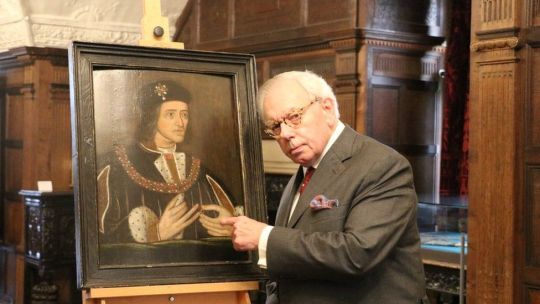
Nobody else could have set up such a vast empire of charitable endeavour: “Only he has the necessary combination of social and economic power and imagination to pull it off.” And here, Starkey argues, lies a formula for survival: “A new kingdom of the mind, spirit, culture and values,” which would appeal even to Oliver Cromwell.
Starkey is particularly good at explaining the shifting tone of monarchical power. After the straightforward Anglo-Saxon model, English kings had to incorporate the Norman way of doing things, with its "chivalric virus"; we then see the Tudors appear with their imperialist vision, followed by the disastrous Stuart belief in the divine right of kings, which James I subscribed to intellectually, and which Charles I paid for with his head. After that we see Hanoverian mediocrity, followed by Victorian pomp, and Windsor flexibility – changing nationality and name as wars with Germany, their ancestral home, demanded.
Crown & Country is a masterpiece of accessible history, underscored with profound scholarship: it takes the essential structure of hereditary monarchy, chronicles the struggles and triumphs of a rich panoply of carefully crafted characters and lays out the story of a nation. Above all, the author's passion for his subject, the royal tale of England, which is the backbone of this nation's story, explodes from every page. I defy anybody not to enjoy this book.
3. Blood Royal: Dynastic Politics in Medieval Europe by Robert Bartlett (2020)
Throughout medieval Europe, for hundreds of years, monarchy was the way that politics worked in most countries. This meant power was in the hands of a family - a dynasty; that politics was family politics; and political life was shaped by the births, marriages and deaths of the ruling family. How did the dynastic system cope with female rule, or pretenders to the throne? How did dynasties use names, the numbering of rulers and the visual display of heraldry to express their identity? And why did some royal families survive and thrive, while others did not? Robert Bartlett’s engaging Blood Royal tries to answer these questions by focusing on both the role of family dynamics and family consciousness in the politics of medieval European monarchical systems circa 500 to 1500 CE.
He creates an authoritative historical survey of dynastic power in Latin Christendom in western and central Europe and the Byzantine Empire (or former Eastern Roman Empire), providing an impressive level of depth while putting aspects of royalty and kingship in perspective. Each chapter brings the reader into this political world and aspects of medieval politics’ ties to family politics. Bartlett transitions seamlessly from example to example, but this apparent ease and vast knowledge reflects years of research and underscores his area expertise.

Blood Royal is an excellent book for anyone who has ever had a question about medieval European monarchy. If you’ve ever wondered how medieval marriages worked, the politics of dynastic succession, or even something as simple as what happened when the current monarch died then Bartlett’s book probably has an answer for you. Blood Royal is split into two sections, the first focusing on the specific lives of medieval royals, with chapters on medieval marriage, children, paternal relationships, as well as female rulers and mistresses. The second section covers dynasties rather than individuals. It is in this latter section that you’ll find discussions of names and numbers, pretenders, as well as heraldry and even the role of prophecy and astrology in medieval dynastic politics.
The scope of Blood Royal is immense. Bartlett includes early medieval dynasties like the Merovingians and Carolingians alongside later examples like the Plantagenets and the Hohenstaufen. Bartlett also incorporates an impressive range of dynasties from across medieval Europe, not limiting himself to just the French, English, and German royal families. Overall, it makes for a very impressive piece of scholarship from a senior historian, but one that is written in a very approachable and engaging fashion. The breadth of the coverage means that no matter where your interest in medieval Europe lies there’s probably something relevant to it in Blood Royal.
4. On Power: The Natural History of Its Growth by Bertrand De Jouvenel (1945)
Bertrand de Jouvenal is one of the most under-read political theorists in Europe today and it’s only in the last couple of decades his works have been translated into English. He wrote two seminal books pertinent to the state and how politics and monarchy mixed. I would thoroughly recommend his book ‘Sovereignty’ (1957) in that regard. How he treats sovereignty is clear and insightful and better than any academic I know. He describes how sovereignty in the modern sense can be traced back to the eleventh century, when absolutism was developed under such rulers as Philip the Fair. Before absolutism, it was acknowledged that every man had his seigniory, the king just as much as a simple farmer. The seigniory of the king was far greater, of course, but only as inviolable as that of every other person (as exemplified in the anecdote of Frederick the Great and the miller). The idea of a sovereignty that flows down from the sovereign to all his subjects was taken from the ancient Romans, and formed the basis of absolutism. One consequence of this was that democracy as we know it became possible in the first place. Before absolutism, there simply was no sovereignty that could be removed from the king and given to the people.
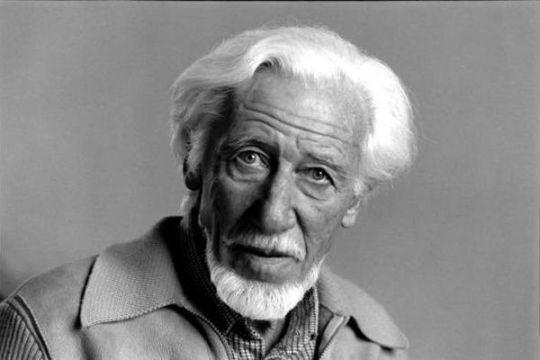
However I’m going to recommend his other book, ‘On Power’, as it’s book that defines the role of power and its relationship to sovereignty and where it came from. It goes into the role of sovereign or dux, and his or her shared responsibility with the larger group. This book explains how absolute monarchy is a recent concept, and as a result of the Enlightenment. It points out the hazards of absolute power within any form of government. It then goes into change v.s. distrust of initiative, and emerging liberalism. One of the best political treatises I have ever read. Bertrand de Jouvenel is unconventional, creative, very thorough and stringent. It's not easy to sum up, as the book is rather suggestive in nature. It doesn't so much tell you the solutions as make you think for them yourself. It gives you tools with which to overthink and analyse political problems, but doesn't force a solution on you.
Bertrand de Jouvenel (1903-1987) was a French journalist and political theorist. During World War II, he participated in the French resistance movement and finally took refuge in Switzerland, where he finished his masterpiece, On Power.
Jouvenel was troubled by the savagery of the war. Such a total war, Jouvenel realised, could not happen without the power of the modern centralised state. Jouvenel called this state, “Power” or “the Minotaur.” The question he set out to analyse was how this monster had grown so large. As indicated by the subtitle of the book, The Natural History of Its Growth, the analysis is meant to be positive political science, as opposed to normative political philosophy. When he wrote On Power, Jouvenel obviously knew little of the libertarian or classical liberal tradition. He has been labelled a “conservative liberal” à la Alexis de Tocqueville (whom Friedrich Hayek, it is worth recalling, does recognise as a full member of the classical liberal tradition).
The modern state has acquired a crushing power that includes war and conscription, an “inquisitorial mechanism of taxation,” and a police more effective than at any time in history. “Even the police regime, that most insupportable attribute of tyranny, has grown in the shadow of democracy,” Jouvenel observes. “No absolute monarch ever had at his disposal a police force comparable to those of modern democracies.” Power has continued and continues to grow.
Power is “command that lives for its sake and for its fruits.” State rulers want power and the perks that come with it. But, Jouvenel explained, in the very process of being self-interested, Power also benefits its subjects compared to what would be their situation in the anarchic state of nature. To gain their support and to make them more productive and taxable, Power provides its subjects with security, order, and other public goods. This is an old philosophical idea dear to defenders of absolutism, but it carries an analytical value of its own.
From Antiquity until the 16th or 17th century, Jouvenel argues, three ways existed to limit Power: divine law, fixed customary law, and powerful social authorities such as the ancient or the medieval aristocracy. All these were overcome. Divine law was brushed away by modern rationalism. Fixed customary law was replaced by changing laws made by absolute monarchs and, even more, by democratic parliaments. The aristocracy was stripped of any power.

Sovereignty, Jouvenel explains, is “the idea… that somewhere there is a right to which all other rights must yield.” The king claimed sovereignty against the aristocracy. Once the aristocracy was defeated, “the people” invoked it against the king. The king was simply replaced by the people or, in practice, by its representatives.
Jouvenel conceives liberty as “the direct, immediate, and concrete sovereignty of man over himself.” It is not participation in government, which is “absurdly called ‘political liberty’.” He forcefully argues that no regime other than aristocracy is “equally allergic to the expansion of Power.” Between the fall of the Roman empire and the modern nation-state, kings had to negotiate grants in aid from the aristocrats in order, for example, to fight wars, which were limited for this very reason. General conscription was unknown and impossible.
Jouvenel argues that liberty has aristocratic roots for it came from aristocrats who had the means and the will to defend their own liberty against Power. Liberty “is a subjective right which belongs to those, and to those only, who are capable of defending it.” It was certainly “a system based on class,” with all the drawbacks that this implies. Jean-Jacques Rousseau, a modern prophet of democracy, suggested that slavery might even be the necessary counterpart of free and independent citizens voluntarily devoting their time to public affairs.
To eliminate the independent social power that the aristocrats represented, kings allied themselves with powerless individuals such as the common people and the new capitalist bourgeoisie. Aristocrats were replaced by “statocrats,” individuals who derived their authority only from their position in the service of the state. The new democratic citizens would soon fall under a Power much more encompassing than that of the local lord.
A crucial idea of On Power, which can also be found in Tocqueville, is that instead of restraining Power, popular sovereignty reinforced it. Democracy was conceived by its early theorists as liberty and the rule of law. But another conception, which won the day, identified democracy with the sovereignty of the people. In this conception, democracy replaces the rule of law by the people’s good pleasure, which in practice means the good pleasure of its elected representatives and the government bureaucracy.
The popular sovereign became the new king, but without the restraints that law and aristocracy previously imposed. Liberty diminished since “[e]very increase of state authority must involve an immediate diminution of the liberty of each citizen.” Like ancient philosophers, Jouvenel sees aristocracy, democracy, and tyranny as the only feasible regimes.
5. The Role of Modern Monarchy: European Monarchies Compared edited by Robert Hazell and Bob Morris (2020)
No new political theory on this topic has been developed since Walter Bagehot wrote about the monarchy in The English Constitution (1867). The same is true of the other European monarchies. So this is a welcome update in terms of what’s happened in the last 150 years or so across Europe. It’s actually the brainchild of a project coming out of the Constitutional Unit at University College London. The book is excellent and is written by experts from Belgium, Denmark, Luxembourg, the Netherlands, Norway, Spain, Sweden and the UK. It considers the constitutional and political role of monarchy, its powers and functions, how it is defined and regulated, the laws of succession and royal finances, relations with the media, the popularity of the monarchy and why it endures. This collections of essays written by academics is the first comparative study of its kind and broadly asks with their formal powers greatly reduced, how has this ancient, hereditary institution managed to survive and what is a modern monarch’s role? What theory can be derived about the role of monarchy in advanced democracies, and what lessons can the different European monarchies learn from each other?
The public look to the monarchy to represent continuity, stability and tradition, but also want it to be modern, to reflect modern values and be a focus for national identity. The whole institution is shot through with contradictions, myths and misunderstandings. This book should lead to a more realistic debate about our expectations of the monarchy, its role and its future. As a whole these twenty contributors notes several factors to the continued survival of the constitutional monarchy in Europe today.

Firstly, remain politically neutral. Monarchs who are too interventionist will encounter resistance and lose their reputation for neutrality. Secondly, avoid scandals, or any hint of corruption. Thirdly, keep the team small. The greater the size of the royal family, the greater the risk that one of its members may get into trouble and cause reputational damage; and the greater the risk of criticism about excessive cost, and too many hangers-on. Fourthly, Understand better the plight of the minor royals, allow them a means of escape and equip them to enter careers commensurate with their abilities. They lead lives of great privilege, but lack fundamental freedoms: the right to privacy and family life which ordinary citizens take for granted, free choice of careers, freedom to marry whom they like. Fifthly, keep in your lane. Although hereditary, the monarchy is accountable, just like any other public institution. The most high profile example is King Juan Carlos of Spain, now in exile and the subject of prosecutorial investigations. But he is not alone: other monarchs who stepped out of line have also lost their thrones.
Arguably the biggest factor of all is how accountable the monarchy is to its subjects - as paradoxical as that sounds. Accountability of the monarchy in a democracy is vital and necessary. Individual monarchs can be forced to abdicate; and support for the institution as a whole can be tested in a referendum. During the twentieth century there were 18 referendums held on the monarchy in nine European countries. It was through referendums that the monarchy came to an end in Italy and Greece, and was restored in Spain; and through referendums that the future of the monarchy was endorsed in Belgium, Denmark, Luxembourg and Norway. The monarchy may seem the very antithesis of a democratic or accountable institution; but ultimately continuation of the monarchy depends on the continuing support of the people for the roles it is seen to undertake. And people can be equally fickle with emotions as they can be reasonable and grounded in common sense.
I would also recommend two videos you can watch online which basically saves your from reading the above - or watching it may inspire you to go and read the books (which would be my intention).
1. Monarchy by David Starkey (TV documentary series)
Monarchy was originally made by Channel 4 as a British TV series that ran from 2004–2007. It was written and presented by the historian David Starkey charting the political and ideological history of the English monarchy from the Saxon period to modern times. The show also aired on PBS stations throughout the United States. You can watch the series on YouTube.
youtube
The first episode looks at discusses the early history of England and the birth of the Monarchy. It looks migration of the Anglo-Saxons into Britain and discusses some early rulers including. It looks at the roles of Aethelbert and his Frankish wife Bertha in the Christianisation of Britain. It examines the dominant reign of King Offa of Mercia. Finally, it looks at Alfred the Great and how he united England against Viking invasion.
2. The Role of Modern Monarchy: European Monarchies Compared: book launch discussion
This is an online discussion hosted by BBC’s David Dimbleby amongst some of the main contributors of the book and the conclusions they reached. It’s very good discussion both wide ranging and insightful how modern monarchies operate across Europe.
youtube
On the face of it, the British monarchy runs against the spirit of the times. Deference is dead, but royalty is built on a pantomime of archaic honourifics and frock-coated footmen. In an age of meritocracy, monarchy is rooted in the unjustifiable privilege of birth. Populism means that elites are out, but the most conspicuous elite of all remains. Identity politics means that narratives are in, but the queen kept her feelings under her collection of unfashionable hats. By rights, support for the crown should have crumbled under Elizabeth has sometimes imagined it might. Instead, the monarchy thrived. And it continues to thrive and thus maddening the bourgeois woke elites and perplexing trendy decolonisation academics.

Writing in the 1860s, Walter Bagehot, The Economist’s greatest editor, noted that under Britain’s constitutional monarchy “A republic has insinuated itself beneath the folds of a monarchy.” The executive and legislative powers of government belonged to the cabinet and Parliament. The crown was the “dignified” part of the state, devoted to ceremony and myth-making. In an elitist age, Bagehot saw this as a disguise, a device to keep the masses happy while the select few got on with the job.
You do not need a monarchy to pull off the separation, obviously. Countries like Ireland rub along with a ceremonial president instead. He or she comes from the people and has, in theory, earned the honour. A dud or a rogue can be kicked out or prosecuted. To a degree, history lays down the choice - it would be comic to invent a monarchy from scratch.

However, constitutional monarchy has one advantage over figurehead presidencies that is the final reason behind Elizabeth’s surprising success: its mix of continuity and tradition, which even today is tinged with mystical vestiges of the healing royal touch. All political systems need to manage change and resolve conflicting interests peacefully and constructively. Systems that stagnate end up erupting; systems that race away leave large parts of society left behind and they erupt, too.
Under Elizabeth, Britain changed unrecognisably. Not only has it undergone social and technological change, like other Western democracies, but it was also eclipsed as a great power. More than once, most recently over Brexit, politics choked. During all this upheaval, the continuity that monarchy displays has been a moderating influence. George Orwell, no establishment stooge, called it an “escape-valve for dangerous emotions”, drawing patriotism away from politics, where love of country can rot into bigotry. Decaying empires are dangerous. Britain’s decline has been a lot less traumatic than it might have been.
Elizabeth’s sleight of hand was to renew the monarchy quietly all the while, and King Charles’s hardest task will be to renew it further. The prospect is daunting, but entirely possible. My money is on the monarchy.
Anyway, this is by no means a definitive listing of books or other kinds of resources such as online resources. But I hope I can give you the flavour of the terrain of how and why monarchies continue to persist but also thrive in today's democratic environment.

Thanks for your question.
#ask#question#monarchy#united kingdom#britain#europe#constitutional monarchy#democracy#the state#society#politics#aristocracy#governance#constitutional#elizabeth II#king charles III#walter bagehot#david starkey
73 notes
·
View notes
Note
Hi there,
I noticed you've been following me for awhile thanks. I saw some of your posts on the Howards and noticed that you mentioned somewhere that the Duke of Norfolk might have played a part in Cromwell's downfall in 1540 in order to get revenge for Anne Boleyn's execution.
That's a very interesting theory and I like it. Is there much evidence for any affection Norfolk or the other Howards had for Anne? I've always seen Norfolk as an evil villain who treated his family badly but maybe there was more to him than that?
Hello.
Sorry it's taken such a time to respond, but as you'll see it's VERY long, so I wouldn't start reading this on the bus.
Part One
As a child I used to be very annoyed by 20th-century writers treating historical figures like ice-cold robots welded to lifeless 'logic', and incapable of doing anything rash or ridiculous.
Oh why would Richard kill the Princes when it'd make him look bad?!
See? It must've been a plot by Margaret Beaufort all along.
(I know it's improved since then, but that first impression stuck.)
Reading history, I've always assumed family members instinctively cared for one another, unless their words and actions proved otherwise, and yet the above mentality pushed the exact opposite: that it was 'irresponsible' to even suggest any sort of natural bond between relatives unless they actually wrote it down, which is an absurd standard.
To me it's as silly as saying 'we don't know' if they breathed air as no one put it in a diary.
What does it matter how long ago they lived? They're still people.
I've even seen the extremely smug attitude that caring about one's own children is entirely a 'modern' invention, and the Mediæval and Tudor age wouldn't have understood such a concept.
Wouldn't have understood love!
Since then I've been interested in emotional bonds between friends and family, given how much closer they were than now, particularly rebelling against the idea Elizabeth didn't care about Anne.
And the Boleyns / Howards are my favourites, so their clannish level of kinship fascinates me the most.
Let's go through some of them:
Catherine Howard, Countess of Bridgewater
Catherine's first husband was Rhys ap Gruffydd, heir of a powerful Welsh family.
Problem was when his grandfather died Rhys got passed over (I expect because he was seventeen) in favour of Walter Devereux (the 10th Baron Ferrers), and Rhys wasn't 'avin that.
Devereux arrested him for disturbing the peace, which sent Catherine bananas as she'd convinced herself they were all out to get her husband.
In response she stirred up the local gentry and marched on Carmarthen Castle, threatening to burn the door down and bust on in there if Rhys wasn't freed.
Well after that unease and bitter factionalism bubbled up to denonation point, with servants killed on either side and Catherine attacking and destroying Devereux's property, meaning he sent word to England descibing BOTH of them as leaders of a 'rebellion and insurrection'.
Rhys sounds like a knob to me. You could say Henry caused this mess in the first place, but Rhys ought to have known where all this was leading.
His Wiki page lays it on that he was some noble folk hero martyred to the Reformation, but adding 'FitzUrien' to his name, thereby playing on ancient Welsh myths and thus (supposedly) announcing himself as Prince of Wales, was pushing his luck to say the least.
That's a worse blunder than Henry Howard made and no one ever feels sorry for him.
I shouldn't think he had conspired with James V, but going by this quote from the chronicler Elis Gruffudd (a very interesting fella in his own right) he wasn't universally mourned:
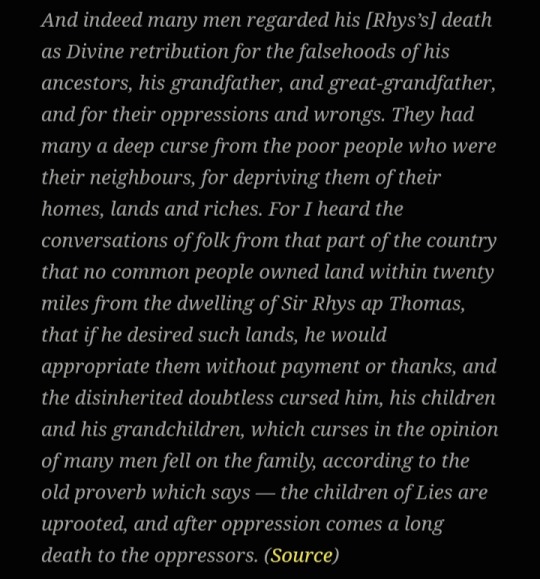
Rhys was beheaded in 1531, but Catherine was in the soup herself after all she'd been up to assisting him.
As Gareth Russell says:
'While we may never know exactly how much his own actions brought about Rhys's death, we can be certain of the devastating effect it had on his widow. She had been intimately involved in her husband's quarrel, and so the possibility that she would be accused of complicity in his alleged treason was tangible.
Left to forge prospects for their three young children — Anne, Thomas and Gruffydd — and fearful for herself, Lady Katherine followed in the footsteps of her elder brother Edmund and flung herself on the mercy of their niece, Anne Boleyn. Once again, the family's dark-eyed golden girl did not disappoint.'
It notable how often you see Anne, and later Elizabeth, willingly pull relatives out of sticky situations, which suggests at least some previous attachment on both sides, as I shouldn't imagine either would be too happy doing it for the more hostile characters.
Compare Katherine's reliance on Anne, a half-niece, to Elizabeth Seymour writing to Cromwell for help, not Jane, her own sister.
'She may even have tried to limit the damage for her aunt and young cousins shortly before Rhys's execution.'
Which was good of Anne considering Rhys had slagged her off, with both of those links having the nerve to imply his death was somehow her doing.
Had he lived, I do wonder if his opposition, compared to Catherine, who, familiarity or not, no doubt wanted to benefit from the connection, would've provoked a certain marital discord.
'Rhys had been attainted at the time of his conviction, meaning that the Crown could seize his goods and property, but his Act of Attainder specifically and unusally made provisions for his widow, who was left with an annual income of about £196.
If Anne could not save Rhys, she worked hard to salvage his family's situation.'
Meaning she got Henry to surrender some of his ill-gotten gains solely to avoid her aunt's destitution, where plenty of other widows and orphans were left to fend for themselves.
Anne also got Catherine a new husband in old-timer Henry Daubeney, but they bloody hated each other and split up soon enough.
According to Eric Ives:
'Over the winter of 1535-6, Katherine Howard, Anne's aunt, was trying to secure a separation from her second husband, Henry, Lord Daubeney. She told Cromwell that the only assistance she was receiving was from the Queen herself, and this despite the strenuous efforts which were being made to destroy her standing with Anne.
The help may have been very practical indeed; Lord Daubeney, who was certainly pleading financial hardship at one stage, reached an amicable agreement with his wife after Anne's father had made available £400.'
Even though this post about Catherine insists neither Anne nor Norfolk gave a toss about her personal woes, from the looks a things Anne was trying to solve this problem too.
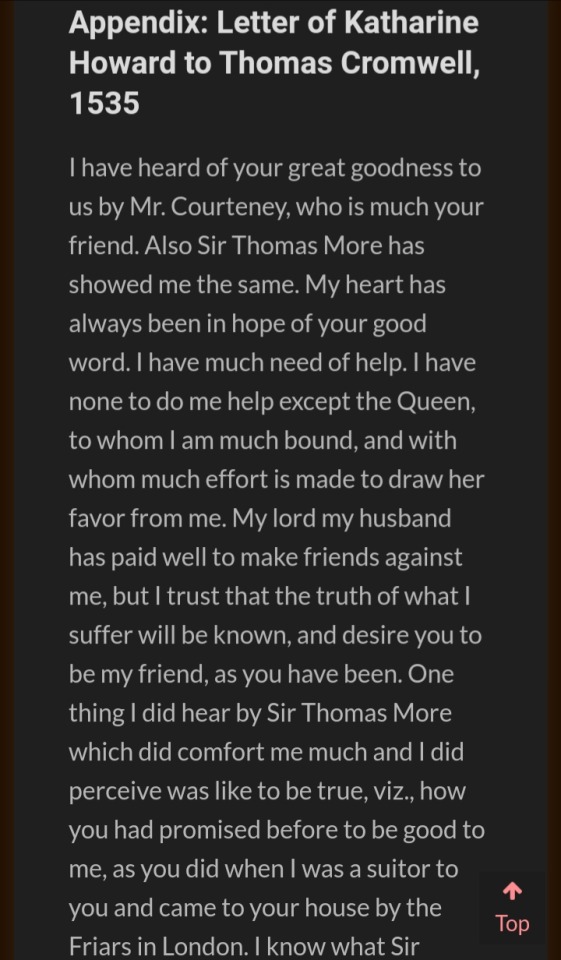
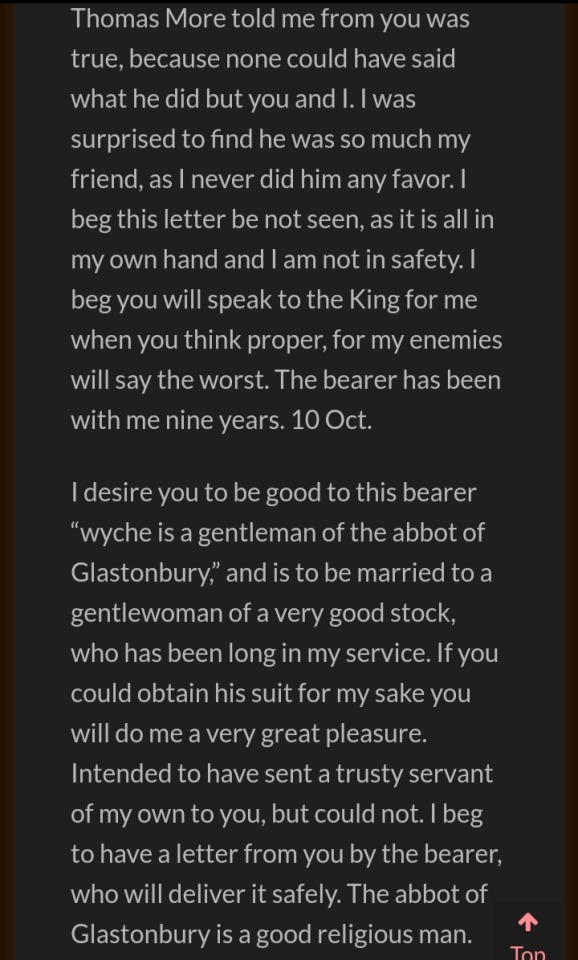
'I have none to do me help except the Queen, to whom I am much bound, and with whom much effort is made to draw her favour from me.
My lord my husband has paid well to make friends against me, but I trust that the truth of what I suffer will be known...'
One wonders how all these paid agitators ended up gathered 'round Anne, nagging or distracting her from Catherine's cause, but evidently she wasn't put off.
Plus, according to that last link, Catherine never learnt her lesson and took part in the Pilgrimage of Grace an' all, raising 3,000 men against Henry!
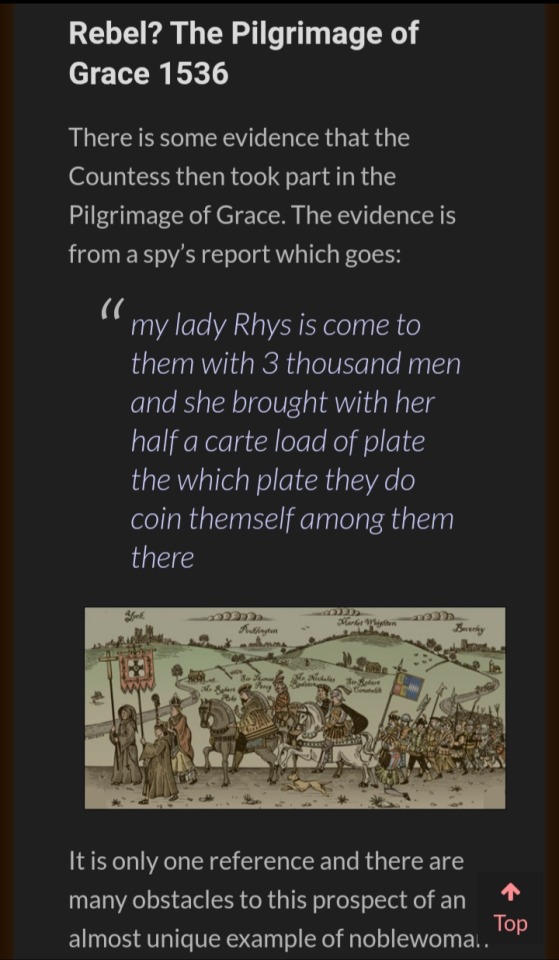
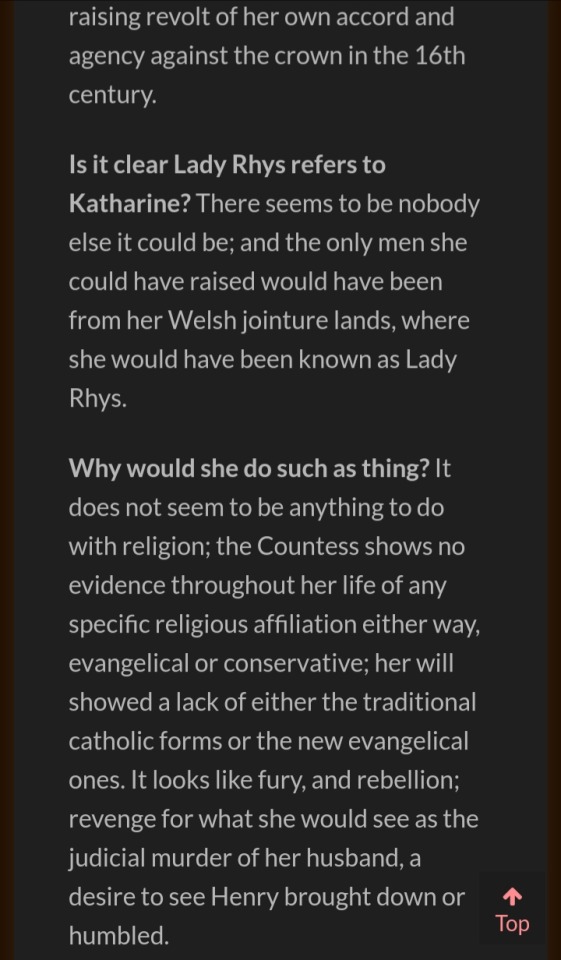
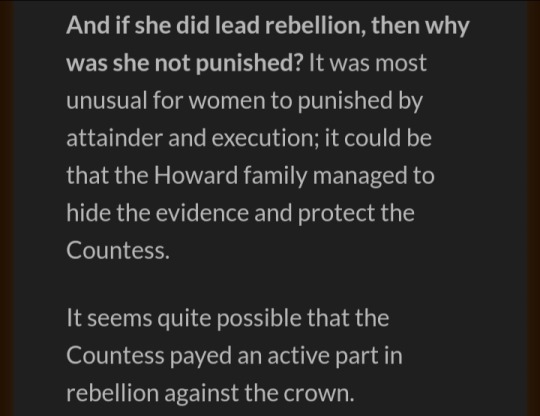
By the sounds of it, this isn't a sudden burst of furious piety at work, rather there's almost an absence of religion in Catherine's life.
The obvious explanation would be yet again wreaking vengeance in Rhys's memory, and that's evident given her long-standing vendetta against his disloyal servants.
But would it be too much to think she was motivated to a certain extent by the death of her niece and nephew, being 'much bound' to the former?
And as she avoided all punishment, the remaining Howards (i.e. Norfolk) had to have covered up for her.
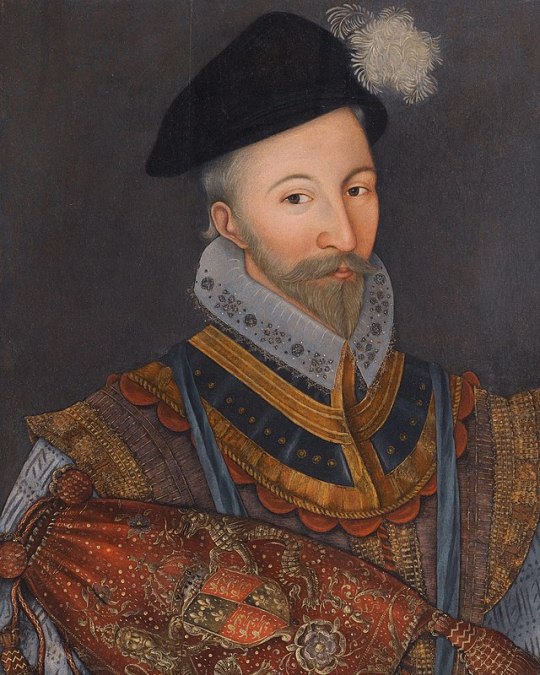
William Howard, 1st Baron Howard of Effingham
In 1529 there was much scrapping over the wardship of the Broughton sisters.
Wolsey ended up with the younger, Katherine, but upon his fall it seems Anne got the girl transferred to the care of Agnes Tilney, who then married her to William, so Anne was responsible for his first marriage.
(Not that it prevented Katherine Broughton from acting, as Ives puts it, as 'ringleader', in a demo for Mary six years later, and getting herself locked up in the Tower as a result, but there you go.)
Given the amount of important roles he enjoyed during Anne's queenship, all whilst barely out of his teens, she must have liked him:
• 1531: Ambassador to Scotland.
• 1532: Travelled to Calais with Anne to meet Francis.
• 1533: Served as Earl Marshal during Anne's coronation, in place of Norfolk.
• 1533: Held the canopy at Elizabeth's christening.
• 1535: Visited Scotland to award the Order of the Garter to James.
• 1536: Went again to Scotland to arrange a meeting between Henry and James.
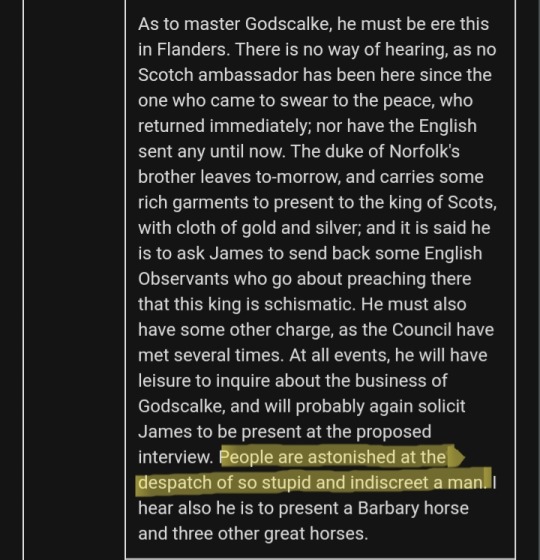
Besides, Chapuys said of him:
'People are astonished at the despatch of so stupid and indiscreet a man.'
So he had to be Anne's friend.
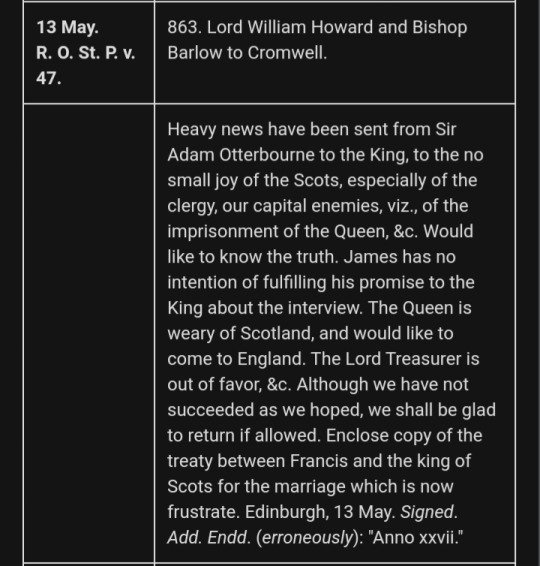
Once he hears of her arrest, William curses it as 'heavy news', demanding to know the truth from Cromwell and resenting all the Scottish clergy as 'capital enemies' for rejoicing in her fall.
Mainly I'm mentioning him to discuss his own character, and where his evident loyalty to other family might give us a further suggestion of his relationship to Anne, and how he kept to that sense of honour even when it led him into dangerous territory.
Consider, for example, how he named his son Charles after his brother, and called his daughter Douglas in honour Margaret Douglas, Charles's wife, thus commemorating their doomed romance.
You'd also be surprised how often he turns up in Young and Damned and Fair, as he appears to have been Katherine's closest uncle, for all that she's usually connected to Norfolk.
Indeed, so deep was he in it Agnes had to be advised not to warn him off coming home, meaning he arrived from France and found himself immediately clapped in the Tower, whereupon he craftily claimed all his best plate was washed overboard so Henry couldn't get at it, which worked.
Later, his connection with Henry Howard ensured he missed out on being Admiral, and when he did get it, Mary took it off him to punish his partiality to Elizabeth.
There's a section here detailing his bond with Elizabeth, where he's credited with saving her life, if you ignore the obvious errors:
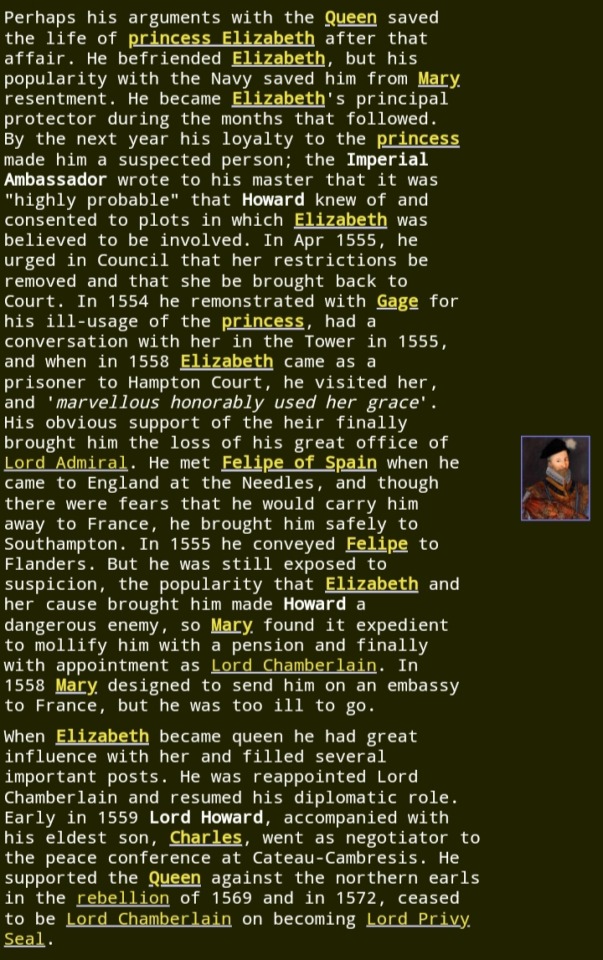
I especially like the idea everyone feared William would kidnap Philip!
However, there's a very odd paragraph in his son's Wiki page:

'In 1552, he was sent to France to become well-educated in the French language, but was soon brought back to England at the request of his father because of questionable or unexpected treatment.'
Am I mad or does this imply Charles Howard endured sexual abuse in his teens?
Were it only poor lodgings or sub-standard teaching, he could've moved elsewhere.
Were it excessive beating, you'd expect it to be made plain, not using all this cagey, obfuscating language.
But the thought did lead me to ponder their father-son bond, where Charles, whatever shame he suffered, knew he was loved enough that writing to his father would make it stop.
And William, reading it, rescued him immediately, proving the boy right.
This is a mere fancy of mine, but when it's just after Elizabeth's ordeal, whom he obviously cared so much about, and knowing she could easily have died like Katherine, which happened in part because he never stopped Dereham, one wonders if his moral failing then pushed him to protect Charles and Elizabeth later.
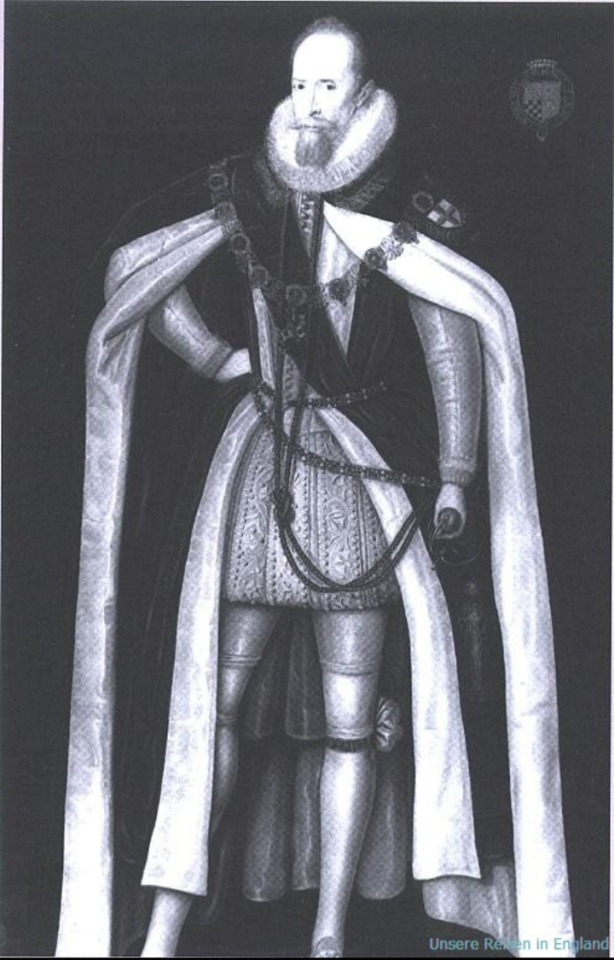
Thomas Howard, 1st Viscount Howard of Bindon
I'm hard-pressed to unearth much information on this lad, but everyone leaves him out so I won't.
There's gotta be some reason Elizabeth ennobled him, and so early on (in 1559) before he'd had the chance to serve her.
It can't just be she looked round the court, noticed he was the last of Norfolk's children, and awarded him for that.
I wish we knew more about Elizabeth's childhood, as in who she met and associated with at court, because you can be certain she met the Howards then.
I also want to add a little about his eldest son, the 2nd Viscount, who was...odd, to say the least:
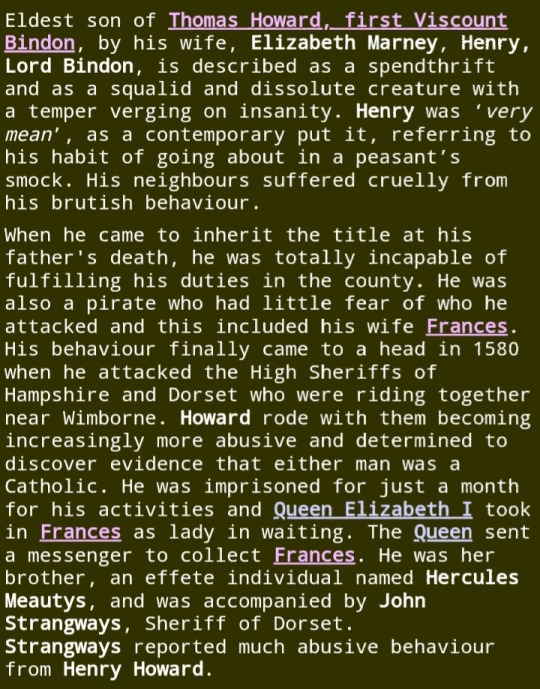
• Being a pirate;
• Dressing as a tramp;
• Beating everyone including his wife.
This gave me the the idea that perhaps his and Norfolk's reputation had somehow been rolled up together over the centuries, where this Henry Howard, although unknown today, was probably infamous in his time, and maybe his behaviour in a sense lended credibility to the accusations of spousal abuse against Norfolk, where people felt Henry 'got it from somewhere'.
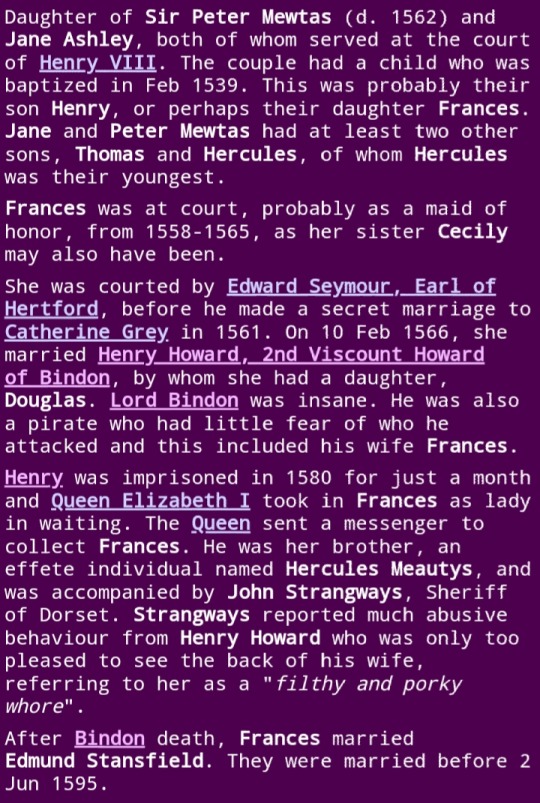
When Elizabeth learnt what he was up to, she sent Hercules Meautys (what a name) to rescue his sister, and took Frances in, with her husband dubbing her 'a filthy and porky whore', which was rich coming from him.
And his other son, the 3rd Viscount, killed his own father-in-law and had a long-running feud with Walter Raleigh.
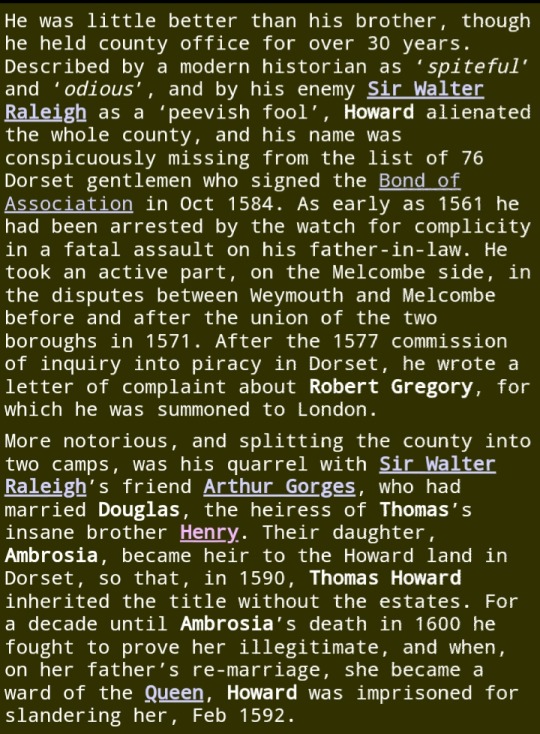
He also spent years trying to have his brother's granddaughter Ambrosia declared a bastard to grab all her land, so Elizabeth locked him up!
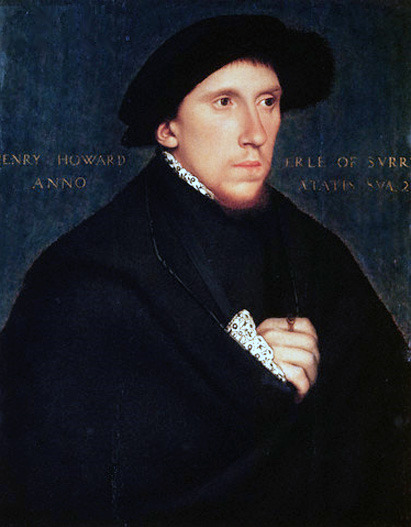
Henry Howard, Earl of Surrey
Anne found Surrey a wife and took him with her to France, where he and FitzRoy remained as honoured guests until the next autumn.
He was then obliged to serve as Earl Marshal as Anne and George were sentenced to death.
Four years later, according to Gareth Russell, Surrey not only watched Cromwell's execution, but gloated about it afterwards:
'Henry Howard, Earl of Surrey, stood at the forefront of the crowd and watched the scene without pity. He was missing his cousin's wedding to be here to see his family's bête noire finished off.
Later that day, he could not conceal his good mood. It felt to him like a settling of scores:
"Now is the false churl dead, so ambitious of others' blood."'
What does this mean?
Who's blood has Cromwell lusted after?
Who did he kill four years ago?
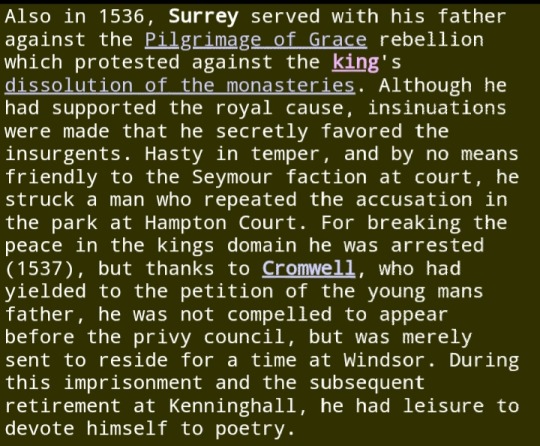
Surrey can't be referring to himself when Cromwell had actually protected him from punishment not long before, which in itself suggests a few interesting things:
• Cromwell was not yet aware of just how much the Howards despised him, as in, up til then his relationship with them was at least civil, cordial even, so the old line about Norfolk begrudging the 'new men' just because they're new men doesn't quite wash.
• This would've the perfect opportunity to bring down a mighty rival, but instead Cromwell felt bizarrely generous and intervened on Surrey's behalf, meaning he saw no harm in preserving the family, and instead thought it useful to get them on side.
• Why does he feel the need to favour the family?
Has he done something to antagonise them?
• The Howards are collectively putting on an Oscar-worthy acting routine of feigned friendliness, or at least indifference to said actions, so Cromwell, whilst he might suspect he's given slight offence, assumes it'll soon be forgotten if he pats them on the head here and there.
• Except whatever Cromwell did, saving Surrey wasn't enough to warrant forgiveness.
And let's examine this quote in detail:
Surrey is at 'the forefront' of spectators, keen to behold Cromwell dying in all its gory brutality, besides opting to watch such a horrendous deed over attending Katherine's wedding.
Instead of a happy celebration of his family's success, something he could've easily enjoyed in the knowledge of Cromwell being dealt with out of the way, he insisted on serving as a witness, as if it wouldn't be over until he'd seen it done, almost to be sure that it had.
For this would 'settle the score', shedding his blood in payback for... what exactly?
Thetford Priory?
Is that all?
Or for the blood Cromwell himself so coveted?
And even the sight of such suffering left Surrey unmoved, ridiculing the dead man not only as a 'churl', but a 'false' one.
False to whom?
'False' as in affecting loyalty to his Queen whilst working to bring her down?
Because is that extreme level of hatred really just supposed to be nothing deeper than empty class prejudice?
Usually, Cromwell's fractious history with the Howards is portrayed as Norfolk's one-man defamation campaign of all-encompassing lordly outrage verging on eye-popping insanity, except Surrey clearly loathed him too.
Perhaps from that we can conclude that Cromwell had become unpopular with the whole family, hence the 'bete noir' reference above.
When Surrey's resentment is remembered, it's conveniently boxed up and filed away as the same-old 'snobbery' of his father, which a very neat, uncomplicated excuse that prevents us looking into it properly.
I daresay Surrey was proud and class-conscious, but wouldn't everyone be like that, to a greater or lesser extent?
Why then is this 'haughtiness' only ever attributed to characters we're supposed to dislike, namely Anne, Norfolk, and occasionally George and Surrey, with the 'good' people somehow immune to such 'base' emotions?
Indeed, I'm starting to wonder how much real evidence there is for this common supposition of arrogance.
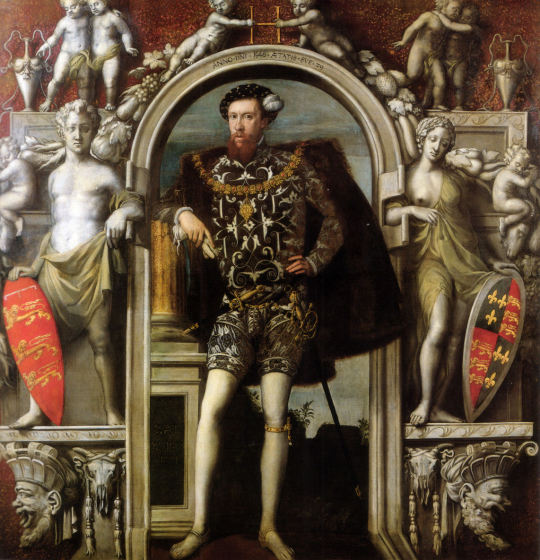
As if Surrey's known at all, it's for the manner of his death, namely he 'got himself killed' by 'stupidly' quartering the royal arms with his own, which, whilst a gross oversimplification, nevertheless defines him, where history views his character through this lens and reads his entire life backwards, as if there's no explanation for his behaviour other than he was just born to be a cocksure moron.
It plays upon modern bigotry against aristocrats, where they're all stuck-up, slow-witted inbreds fixated with the pecking order and archiac symbolism, keeping the honest worker down to prove they're better than everyone else, which is a laugh because they're all REALLY shallow, superfluous chuckleheads and deserve what they get.
Since the idea Surrey died for something so 'silly' as what badge went where slots so well into the stereotype, then it's cheapened his reputation overall.
Rather than being highly esteemed as a pioneer of English literature and the forerunner of Shakespeare, he's treated as nothing but a hot-headed toff tripped up by his own idiotic pretensions, with an end offered as a 'fitting' denouement, almost a lesson in morality; about where not 'knowing your place' or 'getting ideas above your station' leads... after vilifying Surrey and Norfolk for apparently demanding people know their place and not get ideas above their station.
Something hypocritical there.
There's also a reflexive judgementalism within this fandom and the lower end of publishing (i.e. novels and pop. history) where it's assumed if Anne or any of her family are executed, then even if they're technically innocent, they must've deserved it really, else 'the universe' wouldn't let it happen.
Therefore, known evidence is read with the most bad-faith interpretation, with any declared slip leapt upon and blown out of proportion, solely to prove their own bias correct.
You're right to think that, you are.
Hating them makes you A Good Person.
Again, this ONLY applies to Anne and her supporters, not her enemies.
No, no. They were martyrs to the Cause.
But I wouldn't say Surrey's usage of royal arms spoke to any pathological sense of superiority, certainly not to the extent it should define his memory.
Heraldry and ancestry is the lifeblood of nobility: everyone he knew fought for whatever their birth and court careers entitled them, so why shouldn't he?
Look at his sister protesting again and again and again for her rights as FitzRoy's widow: does this make her a 'snob' because she never gave up fighting?
In fact, dubbing Cromwell a 'churl' doesn't mean too much either.
The average person objects to someone because they're a thief, cheat, liar, etc. but calling them as much is a toothless insult, as they'd require a sense of honour to feel the sting.
And if they had that, they would've have committed the offence it in the first place.
So, you pick on something they probably are sensitive about, such as status or physical appearance, to get your own back.
Calling Henry VIII, for example, a fat bastard, doesn't mean you oppose him for having a weight problem, or that you dislike fat men generally.
It's that you're hitting 'below the belt' to inflict the worst punishment you can.
Oh yeah, it's petty, but the aggrieved often are.
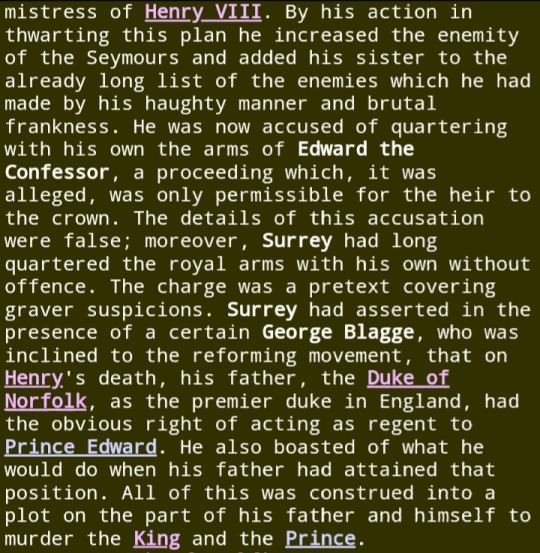
Surrey's real crime, if we deem it one, was apparently rash language of what vengeance he'd wreak on his foes once the King was gone, meaning the Seymours.
So is it mere coincidence that the main targets of this infamous 'snobbery' are those who caused or benefited from Anne's fall?
Are we to believe his only complaint, right down to twice vetoing Mary Howard's marriage, is nothing better than looking down his nose at humble Seymour origins, for they've done nothing whatsoever to draw his ire?
For all the time I've been reading history, the way the court of 1536 splits between the Boleyns and those pushing Jane Seymour, and then, once the Boleyns are wiped out, it greatest rivalry becomes Howard versus Seymour, one lasting for the remainder of Henry's reign, has always struck me as both telling and appropriate.
The idea the Howards took over hating the Seymours because of their slain family is to me to most obvious explanation; the driving force pushing the enmity beyond a decade, and blaming it all on snooty la-di-da attitudes baffles me.
It's so pat and offhand, as if it was thrown into historical research centuries ago and never questioned, passed down to us as unassailable received wisdom, rendered true from repetition, as no one likes Surrey or Norfolk enough to bother reassessing their motivations.
But could such prolonged open hostility run on no greater impulse than keeping the gentry in check?
Is THAT all?
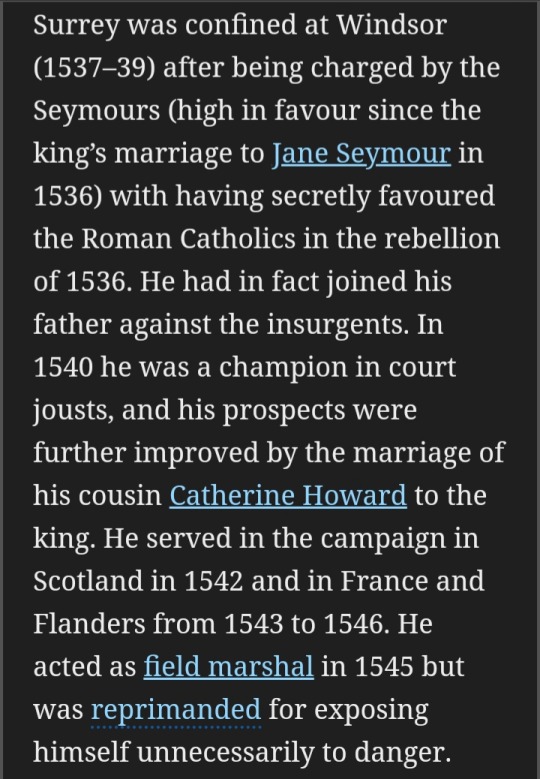
And do note how leading this narrative is, where, if we accept the Howards despised the Seymours as upstarts, then the fault for all bad blood is immediately shoved onto them and them alone, when those poor Seymour lads, rosy-cheeked and pure of heart, are just doing their best in life, working hard and loving everyone.
But oh! Those nasty Howards bullies are So Mean!
Not once is it reversed, proposing that the Seymours envied the Howards' breeding and birth, vowing to bring them down out of spite.
Instead they're absolved of all guilt in the conflict and justified in everything they do as a self-defence measure, even when they brought about Surrey's death and tried it on ten years previously.
So why on earth should he like them?
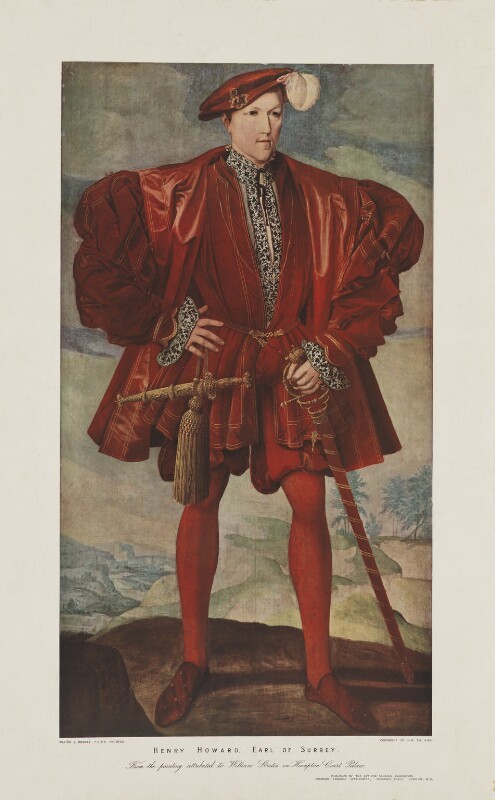
How I wish this painting still existed.
Starkey describes Henry Howard thus:
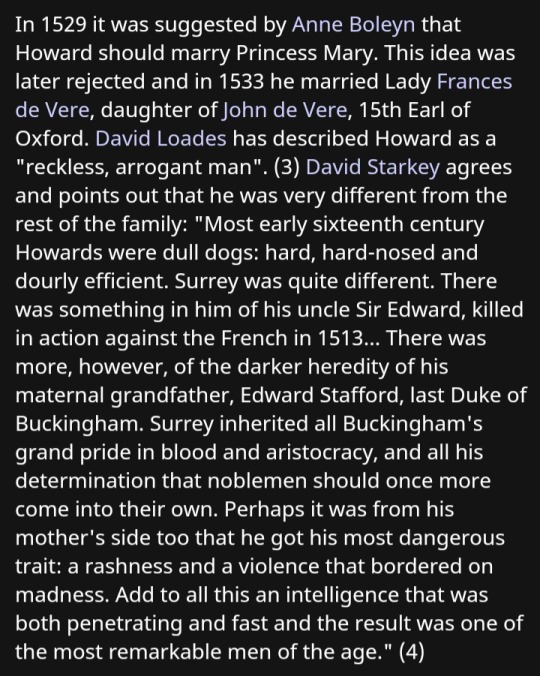
'Surrey inherited all Buckingham's grand pride in blood and aristocracy, and all his determination that noblemen should once more come into their own.
Perhaps it was from his mother's side too that he got his most dangerous trait: a rashness and a violence that bordered on madness.
Add to all this an intelligence that was both penetrating and fast and the result was one of the most remarkable men of the age.'
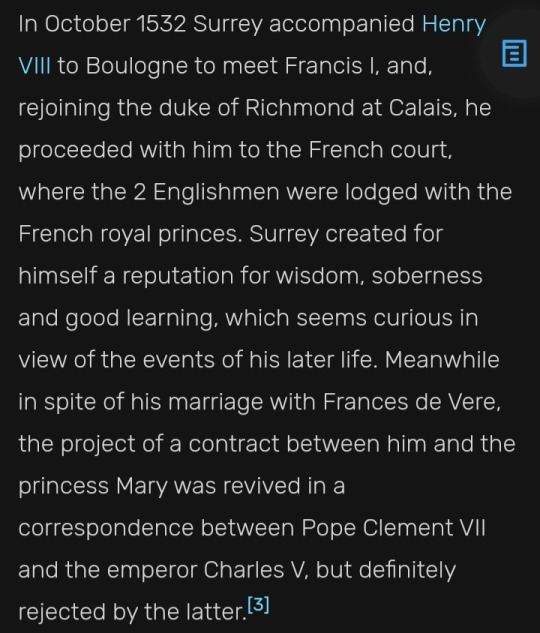
And yet I don't know of any aggressive outbursts prior to 1536, being then known for 'soberness and good learning'.
We tend to class poets of later eras as on the sensitive side, so far from being 'always like that', it may well be that the deaths of George, Anne, FitzRoy and putting down the Pilgrimage of Grace knocked him off the rails, a process then driven beyond all remedy by watching Katherine die and the suicidal shame he endured over his military failures.
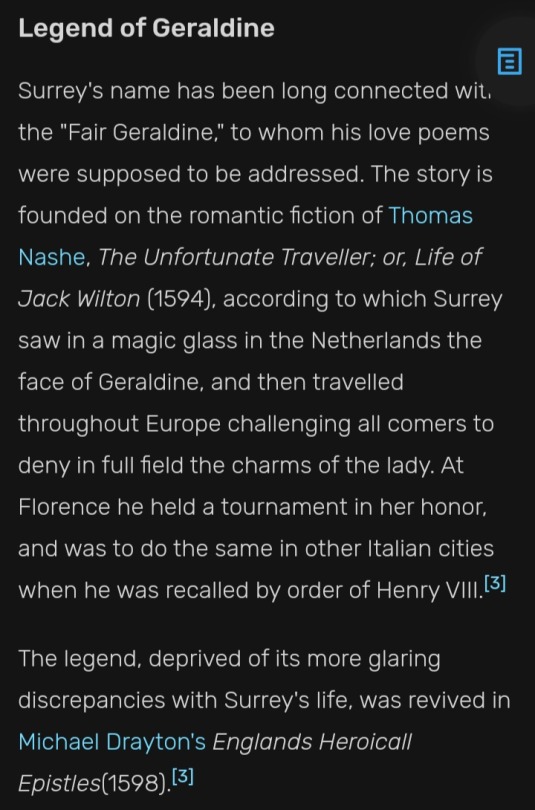
Although I do like the sound of him as the hero of High Fantasy.
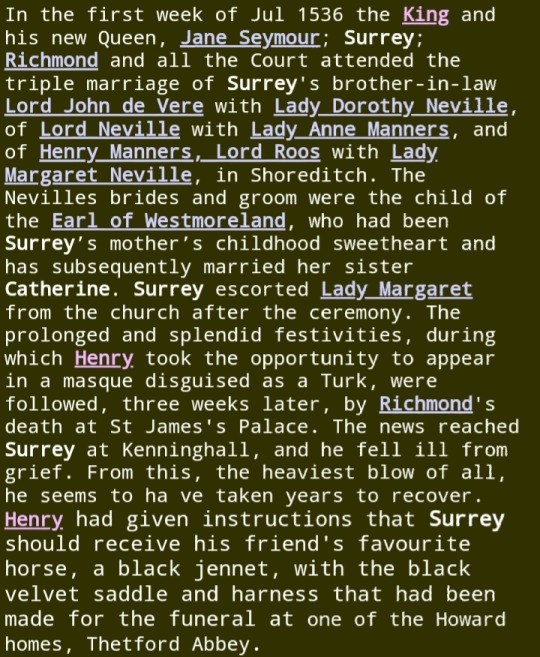
Whilst I'm here, let's look at this very awkward scenario of Surrey attending the triple Neville wedding, being the children of his mother's intended and her sister.
Considering how desperate so many are to clear Henry VIII of Anne's death, protesting how he Genuinely Believed and that makes it alright then, he's cheerful enough fannying about as a Turk less than two months later.
Finally, writing this I read several of Surrey's poems, and must include this truly endearing piece commemorating his wife's love for him:
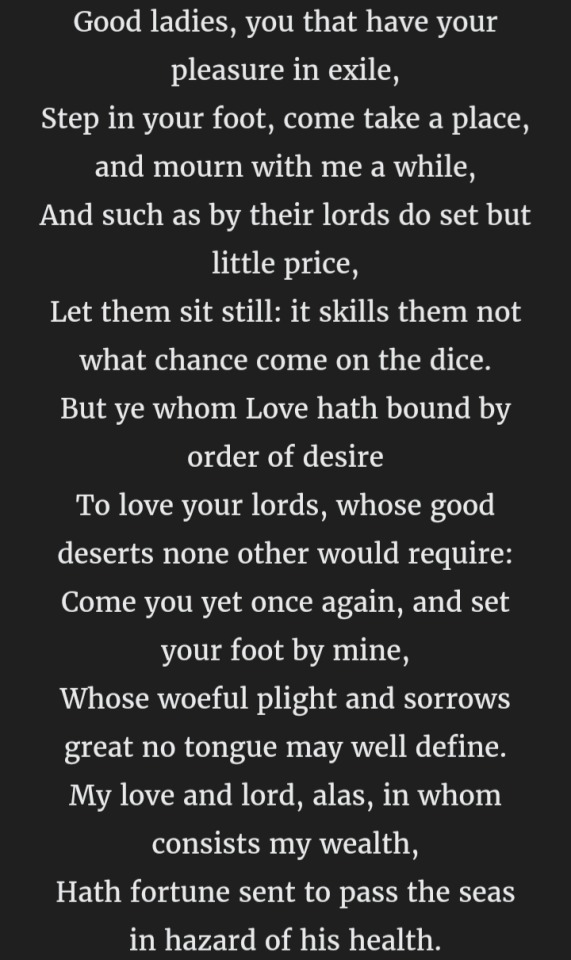
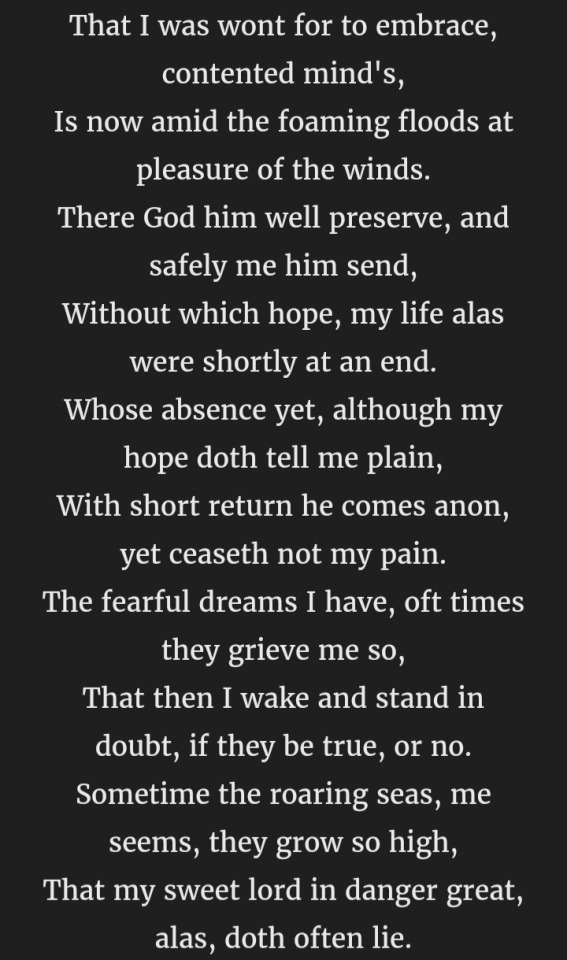
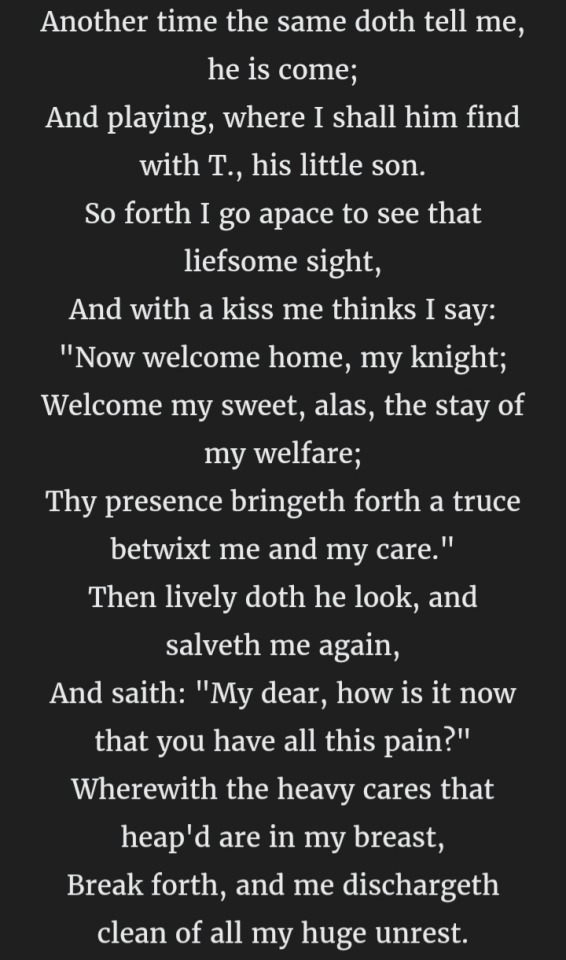
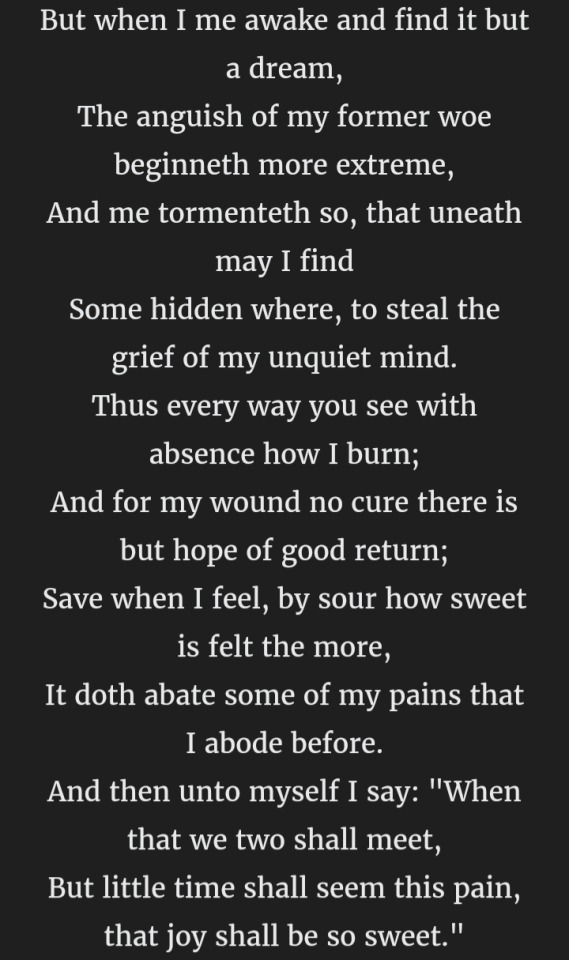
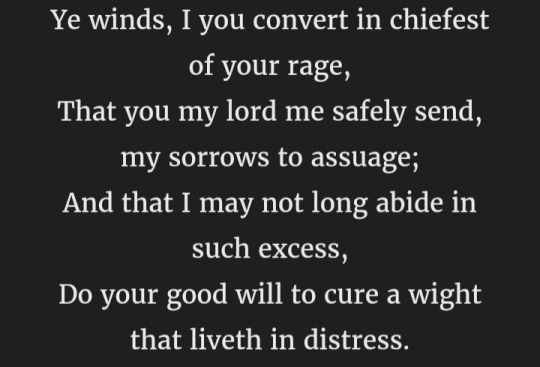
Such a poet, and still no one credits him with any tender emotions.
Anyway, don't mind me but I've hit the picture limit.
I'm not sure when Part Two will be done, but I'll let you know, come the time.
#Henry Howard#Catherine Howard Countess of Bridgewater#William Howard#Thomas Howard 1st Viscount Howard of Bindon#Anne Boleyn#Elizabeth I#Henry Howard 2nd Viscount Howard of Bindon#Thomas Howard 3rd Viscount Howard of Bindon#Frances Meautys#Rhys ap Gruffyd#Thomas Cromwell#Young and Damned and Fair#Gareth Russell#The Life and Death of Anne Boleyn#Eric Ives#David Starkey#Quotes
6 notes
·
View notes
Text
I like to think that Jonathan Sims hates David Starkey with every bone in his body. Like throw darts at a print out of his smug little mole ass face kinda hatred.
#i am projecting#i hate that little man so much#tma#the magnus archives#jonathan sims#jonblogging#tma headcanons#david starkey#those who get it get it
18 notes
·
View notes
Text
Is David Starkey's "Representation through intimacy: a study in the symbolism of monarchy and court office in Early Modern England" available anywhere online? Borman credits it for a date in 1528,
Increasingly, Henry chose to dine with Anne in the privacy of his 'secret lodgings'. In 1528 for example, he was recorded as having dined at Hunsdon in 'a chamber within a tower where his highness sometimes used to sup apart.'
Currently going thru the book for quotes and dates ✍️
4 notes
·
View notes
Text
Farage: The Crown – A Thousand Year Story with David Starkey
4 notes
·
View notes
Video
youtube
What is Britain's National Story?
The Myth of Britain is Britain.
David Starkey refers to Henry VIII as the Inventor of England, as he was the first English king since the Battle of Hastings. Once the Normans invaded, Britain became and arm of the French. Henry VIII was the one who brought Britain back to being a lone country against the despotism of Europe.
Starkey also weaves the Arthurian myth into every English dynasty.
Runtime: 1:20:46
5 notes
·
View notes
Video
youtube
Dr David Starkey: Prince Harry 'makes the Kardashians look dignified'
Dr David Starkey says Prince Harry has become 'the cheapest of D-list celebrities', who is 'constantly betraying' the Royal Family's 'trust and confidence'.
Some good insights into Diana, Harry and Prince William as well as Harry’s possible druggy, muddled future.
6 notes
·
View notes
Text










Portrayals of Elizabeth I in her Coronation Robes 👑👑
Pics include :
Imogen Slaughter from David Starkey's "Elizabeth"
Anne Marie Duff from "The Virgin Queen"
Cate Blanchett from "Elizabeth"
Lily Cole from " Elizabeth I"
👑
Elizabeth's coronation portrait of c. 1600 (based on a lost original) is owned by the National Portrait Gallery whilst the coronation miniature by Nicholas Hilliard is part of the Portland Collection.
#elizabeth#queen elizabeth#queen elizabeth I#queen of england#coronation#crowning#cate blanchett#lily cole#imogen slaughter#anne marie duff#david starkey#westminster abbey#Jan 15th 1559#national portrait gallery#nicholas hilliard#vivat regina#vivat elizabetha
3 notes
·
View notes
Photo
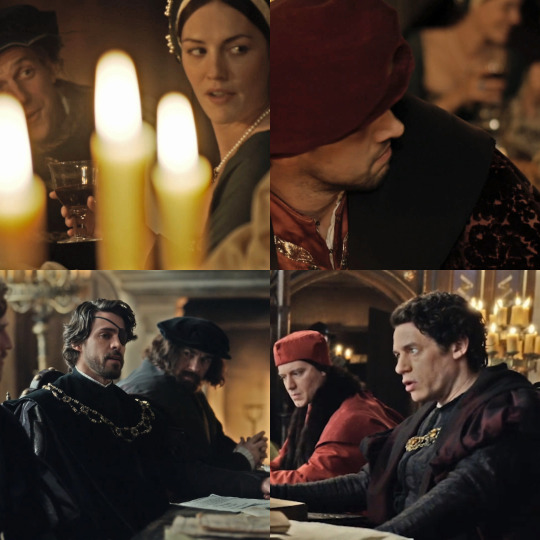
“Historians have been slow to recognise Thomas Boleyn’s position-- as indeed were contemporaries. Instead, it was the showier power of the two Dukes, Norfolk and Suffolk, who attracted comment and adulation.
Understandably piqued, Thomas Boleyn decided to teach the French ambassador, Du Bellay, the new realities of power. The casus belli was an apparently trivial matter of diplomatic business. Du Bellay thought the matter had already been handled by Norfolk and Suffolk. Boleyn quickly showed him his mistake.
‘He let everybody have their say,’ the aggrieved ambassador reported, ‘then argued the opposite and defended it to the hilt.’ His intention, Du Bellay added, was to display his displeasure that ‘one had failed to worship the Young Lady [Anne]’. It was also to confirm the truth of what Boleyn had told him previously. ‘That is to say that none of the other [councillors] have any credit at all [with Henry] unless it pleased the Young Lady to lend them some.’
Did Thomas Boleyn protest too much? I do not think so. Nor did Du Bellay. Thomas Boleyn’s claim about the power wielded by his daughter, Anne, was, the ambassador concluded, ‘as true as the Gospel.’”
Six Wives: The Queens of Henry VIII (2003) / Starkey, David.
22 notes
·
View notes
Photo

I think it's probably true that creative people are touched by melancholy more than the average person, and to the extent that delving into that shadow world produces good work, I'm all for it. But I think you have to be able to step back from the work, and say, "Look how miserable I felt. Look how beautifully I wrote about it. Now I'm going to get an iced coffee and chat with a friend." Writing should be a way out of despair.
- David Starkey
64 notes
·
View notes
Text
Now why did David Starkey have to go and be a shitty little racist git? Why did I only find out AFTER buying and starting to read his book?

#it’s so annoying that he’s a good historian because as a person he’s fucking abhorrent#david starkey#tudor#tudors#history#anyway I’ll finish the book but after that I’m buying none of his books anymore#i didn’t even pay attention to who wrote it when I bought it tbh I just saw it was fucking massive and was like “YES
2 notes
·
View notes
Text
THE DENIALISTS AND COLDRIDGE:
THE DENIALISTS AND COLDRIDGE:
‘THEY DON’T LIKE IT UP ‘EM!’
The news {pingback to 9/4} about a potential important new discovery regarding the fate of Edward V, elder of the ‘princes in the Tower’ at Coldridge church in Devon took recent U.K. newspapers by storm, gaining a considerable amount of press coverage in a short span of time, much of it quite positive and open-minded.
It did not take long, however, for thunderous…

View On WordPress
#"Princes"#Bad Historian#Channel Four#Coldridge#David Starkey#denialists#Edward V#evidence#Leicester#London Guildhall#Mancini#More#mtDNA evidence#Polydore Vergil#Ralph Shaa#Richard III#Richard III reburial#rumours#Sir James Tyrrell#Soar#The Trial of King Richard the Third#Tony Pollard#Tower of London#trials#Tyrrell "confession"#William Shakespeare
3 notes
·
View notes
Text
The American Revolutionary War was not Revolutionary.
The American Revolutionary War was not Revolutionary and how the war effected the American political live until this day
The American Revolutionary Wars for American Independence was a conflict fought between the second Continental Congress/Confederate States of America or the United Confederate States of America from 1775 with the first battles at Concord and Lexington and the conflict’s conclusion in 1783.
The American Revolution is remembered in popular culture, particularly in the United States, as a…
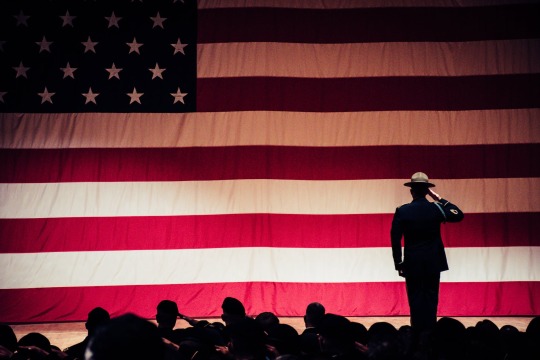
View On WordPress
#13 Colonies of American#American Revolution#American War of Independence#Concord#David Starkey#English History#Johnny Harris#Lexington#Magna Carter#Robert Middlekauff#Rule Britannia
0 notes
Text
Level of delusion: David Starkey whenever he labels a portrait that’s clearly of Catherine of Aragon as Katherine Parr
#if I had a nickel for every time this happened#i’d have two nickels#which isn’t a lot but it’s weird that it happened twice#catherine of aragon#katherine parr#david starkey
1 note
·
View note
Text
Has anyone else seen david starkey’s merch store??? Because my god
heLP

HELP

If hell had a shopping centre this would be in it. Right in the 7th circle
#i hate Brexit/reformation comparisons too I really do#p sure most of his work can be found for free#which is a wee victory at least#history#David starkey#Henry viii#Tudor history
0 notes